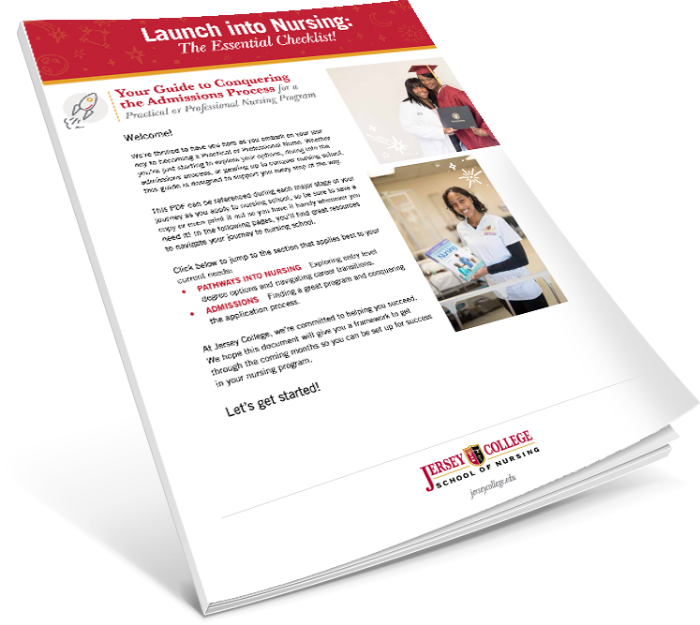
Can You Be a Nurse with an Associate’s Degree?
FAQs About Earning Your Associate’s Degree in Nursing (ADN)
-
Can you take the NCLEX with an associate’s degree?
Yes, ADN graduates are eligible to take the NCLEX-RN to become licensed nurses. Visit our NCLEX Guide to learn more.
-
What is the difference between an ADN and a BSN?
An ADN is a two-year program focusing on practical nursing skills, while a BSN is a four-year degree offering a broader scope of study, including leadership and research. BSN graduates may have more opportunities in management and specialized roles. We explore the similarities and differences between the two degrees in our guide, ADN vs. BSN: The Key Differences.
-
How does an ADN fit into my long-term career goals in nursing?
An ADN is a great starting point and can be a stepping stone for further education and advancement in nursing, including pursuing a BSN or higher degree. For more information about advanced nursing degrees and specialization opportunities, visit our Nursing Degree Guide.
-
How long does it typically take to complete an ADN program?
The program can typically be completed in two years of full-time study, but may take longer depending on a variety of factors. Visit our guide to learn how long it takes to complete nursing school. If starting your career as quickly as possible is a priority for you, you may also be interested in our resource on the fastest way to become a nurse.
Program length is subject to change and is determined based on a number of factors, including, but not limited to: (i) pace of completion, (ii) quantity of credits taken per term, (iii) repeats of coursework, and (iv) leaves.
-
Is it hard to get a nursing job with an associate’s degree?
Nurses are in demand. According to the Bureau of Labor Statistics, the demand for registered nurses is projected to grow by 5% between 2024 and 2034.
Nursing graduates with an ADN can find a wealth of opportunities in various healthcare settings from hospitals to surgical centers, rehab facilities, and residential care. Many healthcare facilities value the practical skills ADN graduates possess and are actively recruiting RNs.
-
Can I work while studying in the ADN program?
Many students successfully balance part-time work with their studies, using effective time management and organizational skills. If this is a route you’re considering, we recommend visiting our Nursing School Survival Guide.

FREE Essential Guide to Nursing School: Get Accepted, Survive, and Thrive!
Requirements to Earn an Associate’s Degree in Nursing
To enroll in an ADN program, applicants typically need a high school diploma or GED. Prerequisite courses often include subjects like biology and anatomy, which lay the foundational knowledge required for advanced nursing studies. Additional requirements may vary, but generally, a strong academic background and a commitment to healthcare are essential.
Every school has its own admission requirements, so be sure to check with an admissions representative at your chosen nursing school.
At Jersey College, our ADN Admissions requirements include, but are not limited to:
- Students must be at least 18 years of age.
- Students must present a high school diploma or equivalent documentation.
- Students must be U.S. Citizens or legal permanent residents.
- Students must complete an application for admissions.
- Students must participate in interviews with administration and/or faculty and obtain a recommendation for admission.
Those who have already become Licensed Professional Nurses (LPNs) may be eligible to enroll in an LPN to RN Bridge program, as well.
Once you earn your Associate’s Degree in Nursing, you must pass the NCLEX and earn (and maintain) a license to become a registered nurse.
Learn more:

Sign up to get new articles in your inbox and stay updated on our nursing programs.
Job Outlook for RNs
As stated above, the Bureau of Labor Statistics reports the demand for registered nurses is projected to grow by 5% between 2024 and 2034. There is a wealth of job opportunities in various healthcare settings for strong applicants who have earned an Associate’s Degree in Nursing.
Graduates with an ADN have a wide range of career opportunities in diverse healthcare environments. These include hospitals, clinics, nursing homes, and community health centers. Roles can vary from general staff nurse positions to specialized areas like pediatrics, geriatrics, and more.
Entry-Level Nurse Duties
Entry-level nurses with an ADN are typically involved in direct patient care. Their duties include administering medication, coordinating patient care plans, and assisting with diagnostic tests. These hands-on clinical tasks are crucial in ensuring effective patient care and recovery.
Learn more:
Find Your Campus
Based on the success of our programs, we have grown to serve communities in 7 states (and counting!). Find a campus near you to start your NurseLife.
- Arizona
- Tucson
- Professional Nursing (ADN): Traditional RN | LPN to RN Bridge
- Mesa
- Professional Nursing (ADN): Traditional RN | LPN to RN Bridge
- Tucson
- Alabama
- Dothan
- Professional Nursing (ADN): Traditional RN | LPN to RN Bridge
- Dothan
- Florida
- Brooksville
- Professional Nursing (ADN): Traditional RN | LPN to RN Bridge
- Fort Lauderdale
- Professional Nursing (ADN): Traditional RN | LPN to RN Bridge
- Jacksonville
- Professional Nursing (ADN): Traditional RN | LPN to RN Bridge
- Practical Nursing (PN): LPN Program
- Largo
- Professional Nursing (ADN): Traditional RN | LPN to RN Bridge
- Melbourne
- Professional Nursing (ADN): Traditional RN | LPN to RN Bridge
- Naples
- Professional Nursing (ADN): Traditional RN | LPN to RN Bridge
- Port Charlotte
- Professional Nursing (ADN): Traditional RN | LPN to RN Bridge
- Tampa
- Professional Nursing (ADN): Traditional RN | LPN to RN Bridge
- Practical Nursing (PN): LPN Program
- Brooksville
- Indiana
- Fort Wayne
- Professional Nursing (ADN): Traditional RN
- Fort Wayne
- New Jersey
- Ewing
- Professional Nursing (ADN): LPN to RN Bridge
- Practical Nursing (PN): LPN Program
- Teterboro
- Professional Nursing (ADN): LPN to RN Bridge
- Practical Nursing (PN): LPN Program
- Ewing
- Pennsylvania
- Scranton
- Professional Nursing (ADN): Traditional RN | LPN to RN Bridge
- Jenkintown
- Professional Nursing (ADN): Traditional RN
- Practical Nursing (PN): LPN Program
- York
- Professional Nursing (ADN): Traditional RN | LPN to RN Bridge
- Scranton
- Tennessee
- Cleveland
- Professional Nursing (ADN): Traditional RN | LPN to RN Bridge
- Knoxville
- Professional Nursing (ADN): Traditional RN | LPN to RN Bridge
- Cleveland

FREE Essential Guide to Nursing School: Get Accepted, Survive, and Thrive!
